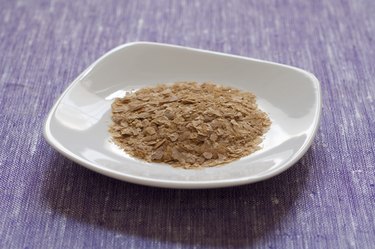
Deactivated yeasts may not sound like tantalizing treats, but they offer a bevy of nutrients that make them a healthy addition to any diet. Yeast is a fungus and, like mushrooms, completely safe to consume. You can find both nutritional yeast and brewer's yeast in health-food stores, but don't confuse the two. They have different nutritional profiles and flavors.
Yeast Origins
Video of the Day
Nutritional yeast is a powdery or flakey yeast usually bought in bulk. Vegans and vegetarians enjoy it as a supplement, but others can benefit from adding it to their diets. It's usually a form of Saccharomyces cerevisiae, which is harvested, pasteurized and dried to deactivate it and enhance its nutritional properties. Brewer's yeast has a similar look and is also derived from Saccharomyces cerevisiae, but it's produced as the byproduct of beer-making. It, too, is pasteurized and deactivated.
Video of the Day
Nutritional Discrepencies
Nutritional yeast offers substantial amounts of niacin, folic acid, zinc, selenium and thiamine. Manufacturers often fortify nutritional yeast with vitamin B-12. For vegans, this is an essential addition because they are susceptible to B-12 deficiency since the vitamin is usually found only in animal-derived products. Nutritional yeast also offers a number of essential amino acids, the building blocks of protein. Brewer's yeast offers an array of B-complex vitamins, selenium and protein, but it's also rich in chromium, a trace mineral that regulates blood sugar levels. Brewer's yeast does not provide vitamin B-12, while nutritional yeast does not provide chromium. Vegans looking for a B-12 supplement should stick to nutritional yeast rather than brewer's yeast.
Different Flavors
Brewer's yeast has a bitter taste that offends some taste buds. It may even have a beerlike aftertaste, which reveals its origins. Nutritional yeast, however, is cheesy and nutty without the bitterness of brewer's yeast. You can stir either yeasts into sauces, add to soups or whiz into a smoothie. Nutritional yeast is tasty enough to sprinkle straight over popcorn or pasta to mimic Parmesan cheese. Nutritional yeast is superior if you're looking for a vegan replacement for cheese in macaroni and cheese or nacho cheese dip. If you're committed to brewer's yeast but are offended by the taste, look for debittered varieties.
Don't Confuse 'Em
Brewer's yeast and nutritional yeast are both perfectly acceptable to consume as is from the package. Active dry yeast, however, is for bread-making only. Consuming it raw could cause gastrointestinal distress and nutritional deficiencies as the organisms continue to grow and expand in your stomach. You cannot use nutritional or brewer's yeast to raise bread dough, either. Beer yeast may be labeled as brewer's yeast, but it's still active so it can ferment to create the carbonation in the alcoholic drink. Usually, you'll only find beer yeast in beer-making stores and online, not in the supplement section at your health-food store.